Archives
Germany Signs Massive €1 billion Israel Drone Deal
June 15, 2018
by Zvi Manasseh | Jun 15, 2018 | BDS, IDF, Israel

German lawmakers have approved a massive deal to lease several Israeli-made Heron-TP drones in a deal worth an estimated €1 billion ($1.2 billion), despite significant pressure against the German government.
Israeli Prime Minister Benjamin Netanyahu has been busy with brief trips to multiple countries in the last two weeks, including Germany and Britain, and has welcomed numerous senior officials to Jerusalem over the same period. According to a statement from the Prime Minister’s Office, the deal was discussed while visiting German Chancellor Angela Merkel in Berlin last week.
The surveillance drones, made by Israel Aerospace Industries, were subject to intense scrutiny within Germany as they can be equipped with air-to-ground missiles capable of eliminating targets miles away.
The Heron TP models being leased are vaunted as IAI’s most advanced UAVs, with the flexibility to function in reconnaissance, combat and support roles. They boast flights of up to 40 hours, can carry payloads of 2,204 pounds, and cab take off with a total weight in excess of 11,600 pounds.
IAI has now confirmed an agreement was signed with Airbus, allowing the lease of the Heron TP Medium Altitude Long Endurance (MALE) drones to Germany’s Federal Ministry of Defense.
Testament to Israel’s potential to contribute to countries like Germany
Prime Minister Benjamin Netanyahu welcomed the deal.
“This is an enormous contribution to the Israeli defense industry and the Israeli economy. This giant deal is an expression of the strategic cooperation between Germany and Israel and attests to the potential of the Israeli industry to contribute to countries like Germany,” read a press statement released by Netanyahu’s office.
Germany’s coalition parties agreed in February to lease unarmed drones built by Israel Aerospace Industries and to hold a debate on arming the aircraft at a later date.
The opposition Greens party voted against the deal, noting that €50 million ($59 million) had already been set aside for a program to arm the drones.
“The big promised debate about the arming of the drones is a farce given what’s already included in this contract,” said Greens lawmaker Tobias Lindner, who is on the budget committee, according to the Reuters news agency.
Sign of deepening ties between Israel and Europe
According to the deal, the drones will be leased through 2027. This nine-year agreement requires final approval from the German government, which is expected by the end of the year, IAI said. This part of the deal, worth $600 million, is between IAI and Airbus and allows the two to oversee the project. The second part of the contract a sign of the deepening ties between Israel and Germany, is between the two governments, and specifics that the Israel Defense Ministry is to provide logistical support, oversee training and infrastructure.
Shabbat Shalom from Bat Ayin
June 15, 2018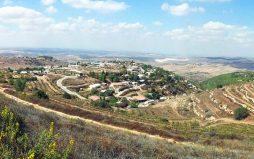
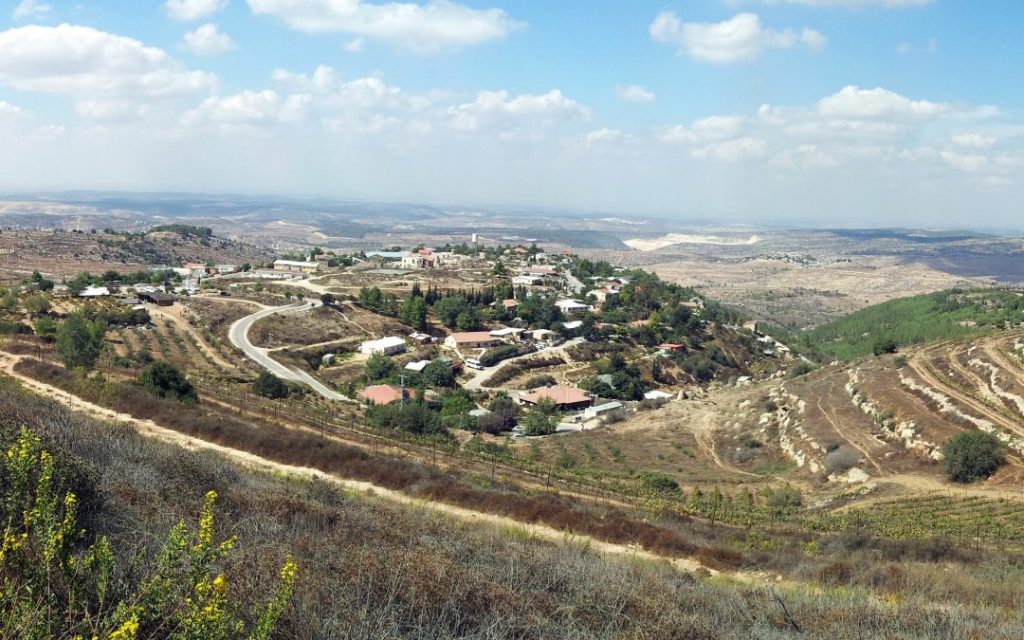
Bat Ayin is located approximately twenty-five kilometers south of Jerusalem, in the area of Judea known as Gush Etzion (or Eztion Block in English). All of the communities of Gush Etzion are adjacent or connected to a road called Derech Avot (road of the fathers). This road, which still exists, gets its name from the fact that it is the road that all of the Jewish patriarchs traveled while they resided in Israel.
Bat Ayin was established by seven families led by Rabbi Yitzchak Ginsburg in 1989, on land originally purchased by Jews before 1948, which, under Jordanian rule until 1967, was treated as “enemy property”.
Bat Ayin is located within the jurisdiction of the Gush Etzion Regional Council. In 2015 it had a population of 1,226. The city is located in the portion of Israel that was designated for the tribe of Yehudah (Juda).
Bat Ayin is also the home of many of our producers! Some of our recent packages contained products from Shlomit Cohen and Elisheva Shira. In fact, Shlomit has an amazing product coming in this month’s package from Lev Haolam.
Thousands Enjoy Cherry Picking Festival in Judea
June 3, 2018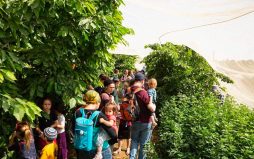
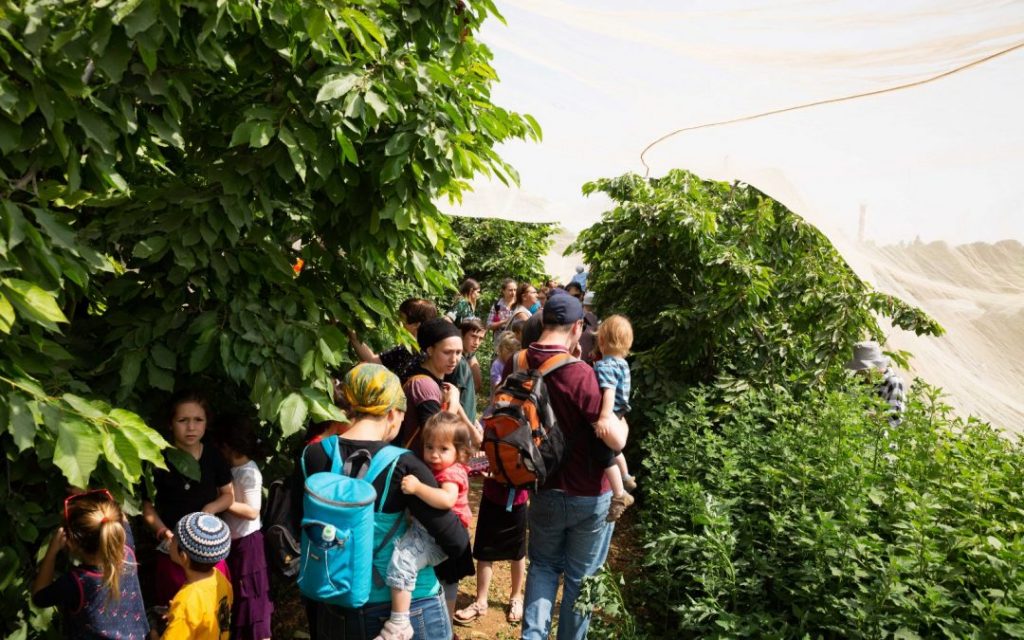
Tourists visit Kibbutz Rosh Tzurim for the traditional cherry picking festival. (Photo: Courtesy)
Over 8,000 people flocked to Kibbutz Rosh Tzurim in the Gush Etzion region in Judea, just south of Jerusalem on Friday for the annual cherry picking festival, less than two weeks after a nearby cherry orchard was attacked and torched by Arab assailants. The assailants responsible for the pre-dawn attack, using burning tires, have so far not been identified.
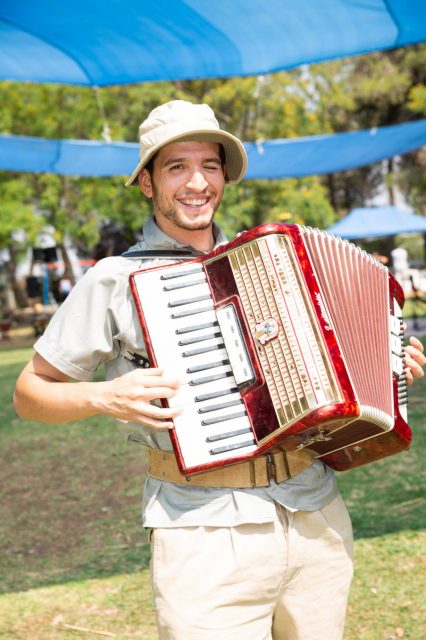
Nevertheless, the festival continued and hundreds of families and took the opportunity to enjoy a healthy, natural and fun day out. Visitors were told that it was an “all you can eat” affair, and that they could take home baskets of fruit for a modest fee.
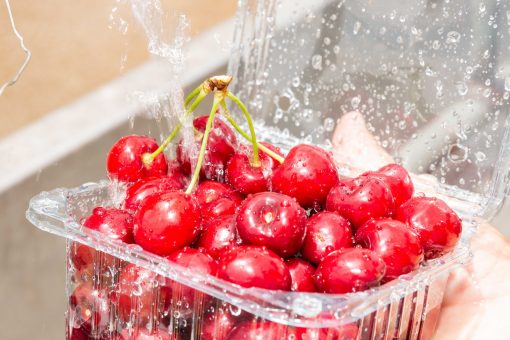
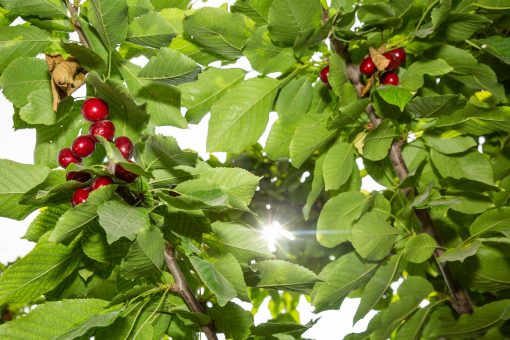
Many took the opportunity to “self-harvest” and filled their baskets with ripe, juicy cherries in the Kibbutz Rosh Tzurim orchards.
Tourists came from all over Israel, young and old, religious and secular, to take part in the colorful event which included music, a farmers’ market, tasting stations with dishes prepared by the in-house festival chef, food stalls, workshops, performances and fun activities for the whole family.
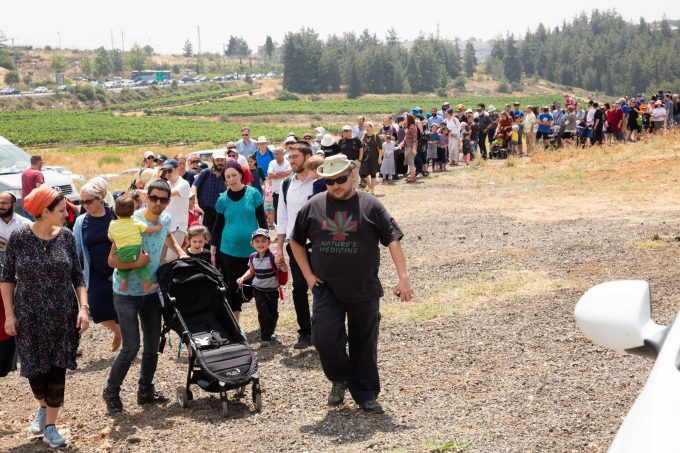
Moshe Bruce, chairman of the Gush Etzion tourist board said, “It’s wonderful to see thousands of visitors from all over the country coming especially to Gush Etzion in order to participate in the festival and enjoy the finest cherries and all the family activities on offer. We invite everybody to come and visit Gush Etzion; where they’ll discover a beautiful part of the land with special tourist attractions and events.”
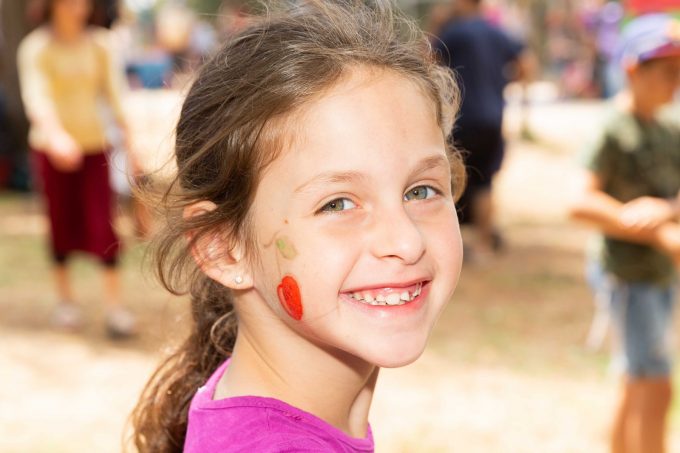
Exclusive: The Story of Saboneto’s Shlomo Keshet
May 29, 2018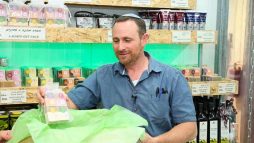
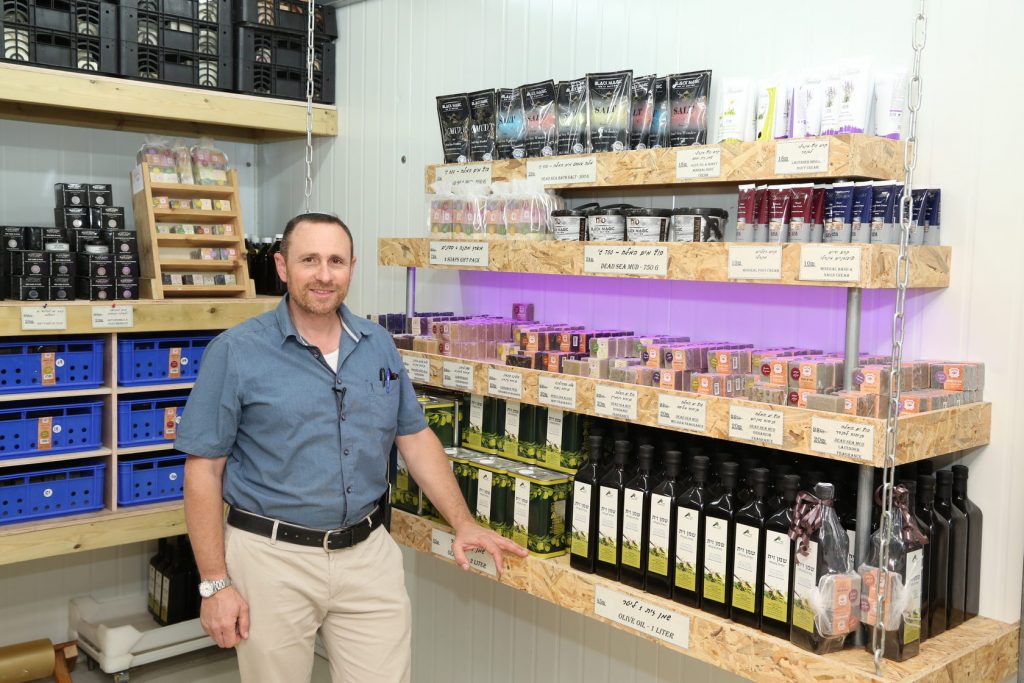
Winding up Route 458, just half an hour North of Jerusalem, Kochav Hashachar peeks out from the horizon on the top of one of the hills apart of a vast chain of rolling mountains. The high school, which is most prominent from the road, displays its vast campus and the residential community is not situated too far behind on the next hilltop. Kochav Hashachar overlooks the stunning mountain ranges it sits on, with the mountains stretching across the border into Jordan. On a clear day, you can also spot the Dead Sea. The sunrise must be breathtaking, especially since the village is named “Morning Star” in English. It is here, in Kochav HaShachar, Shlomo Keshet has set up his workshop for his business, Saboneto.
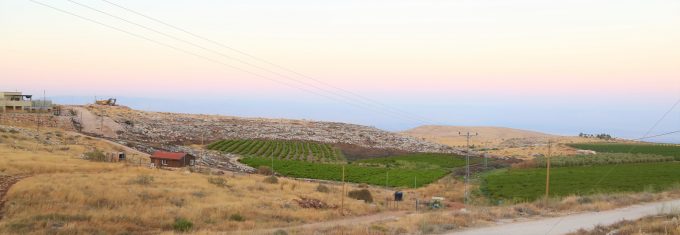
Saboneto is a young company of only five years! The thought and love that went into its creation started a long time ago. Sholomo Keshet used to work at an Israeli olive oil company and learned all about the health benefits and unique properties of olive oil. Inspired by his work and combined with his dedication and love of the land of Israel, Shlomo planted an entire orchard of olive trees in the Binyamin region.
During the first olive harvest, Shlomo decided to not only collect the olives, but to harvest all the benefits they contained. He started the process of pressing and cooking them to make olive oil. With that olive oil, he started to experiment with making all-natural, healthy soaps. He tried many combinations of different oils and locally-sourced herbs. Spending weeks creating new formulas and concoctions, finding and experimenting with plants and herbs from Israel, and even adding the acclaimed Dead Sea mud and salt, Saboneto was born.
Energized by the health benefits, the entire family started to take part. However, within the Keshet family, there is a much older story. Twenty years ago, before Shlomo started Saboneto or even started to work with olive oil, his wife, Naami, gave birth to their fourth son, Elnatan. Elnatan, which means “G-d Gave,” was born with Down Syndrome. The moment they found out, they decided that their new life’s mission was to use all their resources and strengths to help all their children reach their maximum potential- Elnatan included. With the family involved in Saboneto, it was no longer just the combination of Shlomo’s love for olive oil’s health benefit and cooking/craftin; Saboneto also included the love for Shlomo’s son. Opening up a factory close to home became a unique opportunity for Elnatan. Instead of fearing what was to come after Elnatan graduated high school, Saboneto provided a place for him and his classmates to work.
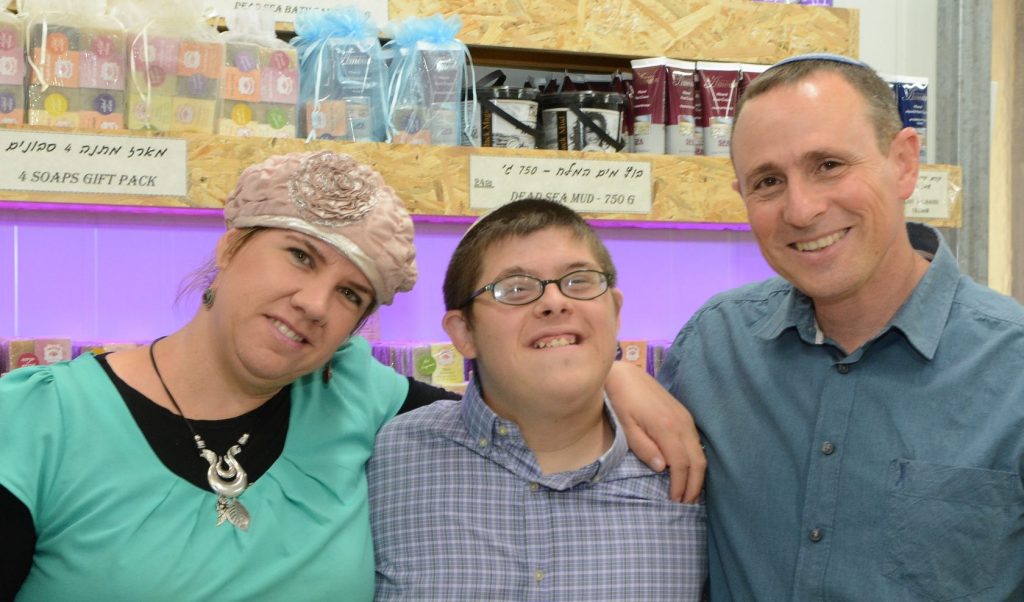
Shlomo explained the options for Elnatan’s employment were limited, as one of the closest places for Elnatan to get a job with the proper support was Shekel, in Jerusalem. The organization, Shekel, which provides employment for people with all sorts of special physical and emotional needs, is a wonderful place. In fact, Lev Haolam employs many of Shekel’s participants to pack our monthly packages. But as Shlomo explained, it was just too far from their home in Kochav Hashachar. So today, Elnatan works in the family business with a few of his friends. In fact, the entire company only employs nine people, half of which have special needs.
In addition to helping his son and his friends find employment, Shlomo wanted to make sure that the factory they were working in was beyond just safe, but healthy, too. It was very important to Shlomo and his family that the soaps are all-natural so that they are healthy for the people and the environment.
To make the soap, they first prepare the special family recipe, which includes: olive oil, coconut oil, palm oil, castor oil, almont oil, sesame oil and shea butter. This oil makes a rich composition for all their soaps, giving them a texture that lathers and indulges.
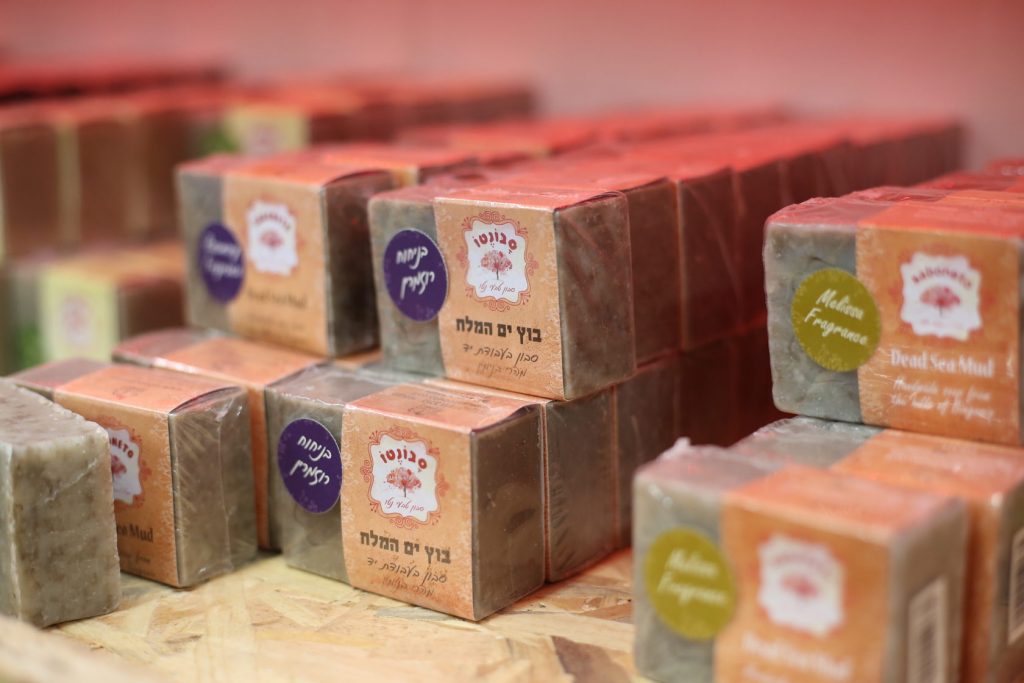
For the scents and texture, the Saboneto family goes to the fields in the morning to collect fresh, organic herbs. Some of these include: rue, rosemary, rose hips, sage, daphne, olive leaves, mint, melissa, nettle, thyme, lemon grass, hyssop, oregano, frankincense, lavender, lemon verbena, basil and more. They then take these fresh herbs and cook them in hot water, turning nature’s finest plants into a fragrance.
Once all the ingredients are set to go, they combine their unique oil formula with Dead Sea mud, to add all the natural benefits of Israel’s most famous therapeutic resource. They then infuse the fragrance and any other unique plants for additional benefits. Once mixed together, they pour the mixture into molds and cut it after a few days. They then set it aside to age approximately a month. This preserves the benefits and scent in a natural way without additives.
When we asked Shlomo Keshet about his relationship with Lev Haolam and how he found out about us, he said it was actually Nati Rom (Lev Haolam’s founder) that found him! He said Lev HaOlam has been there since the beginning and we were their first large order. When asked about if Lev Haolam helped his business he concluded:
“…No question, whoever buys Lev Haolam packages directly helps, encourages and becomes a partner and, you can even say, an investor for everyone here in Judea and Samaria. Thereby expressing his or her love for and connection to the Promised Land.”
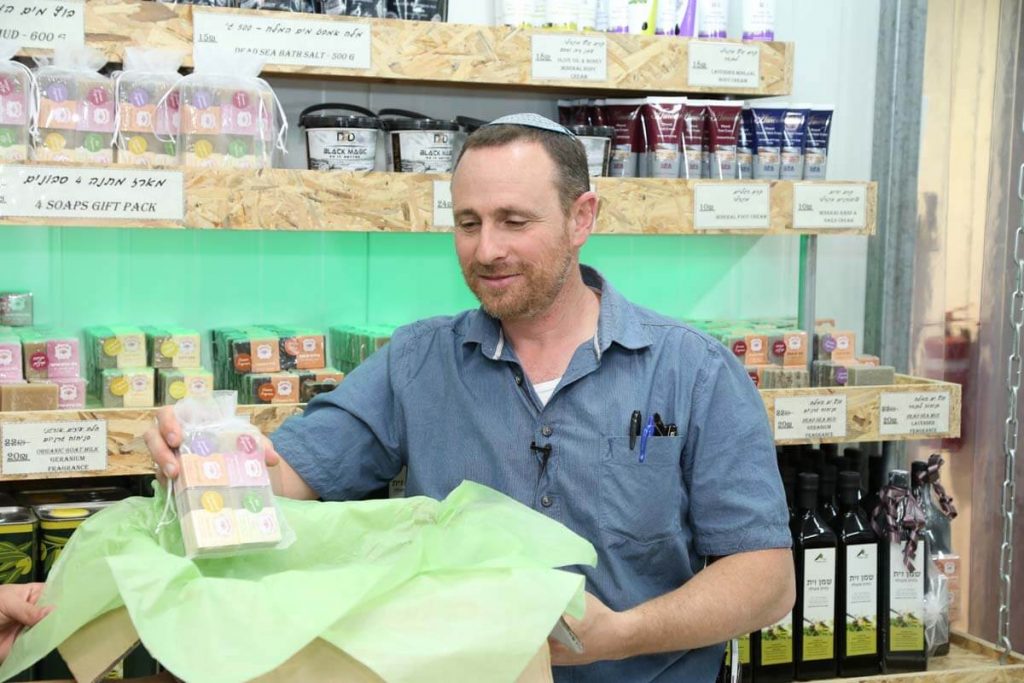
On Stage: BDS vs Neta Barzilai
May 10, 2018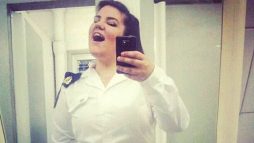
by Zvi Manasseh | May 10, 2018 | BDS, Israel
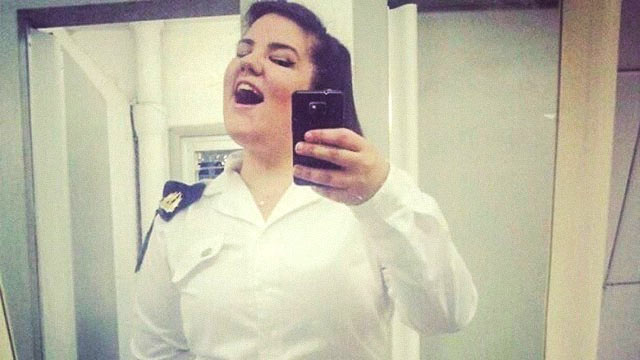
Netta Barzilai, Israel’s representative and bookmakers’ favorite to win the 2018 Eurovision contest, held this year in Lisbon, has come under fire from anti-Israel activists calling for the public to boycott the musician.
Activists in the BDS Movement last week opened a Facebook campaign in Europe calling on the public to sabotage Israeli participant Netta Barzalai’s chances by giving her “nil points” (zero points) in the popular song contest.
BDS activists are claiming that they are trying to ensure her failure to win because she represents a country that runs an “apartheid policy and brutal oppression”. They also said that each of the singers do not attend the contest purely to sing, but rather to represent their countries of origin. One prominent anti-Israel website even admitted that Barzilai doesn’t seem to have any involvement in the military or notable political opinions, but the very fact that she is a normal Israeli who served in the IDF and who is “part of the system”, means she is worthy of boycotting.
The campaign, titled “Eurovision boycott of Israel – ZERO points to the song of Israeli Apartheid,” uploaded a photo of Netta from her days in the Israeli Navy’s band, noting she had served in 2014 during Operation Protective Edge and sang “My Sailor, My Angel” to IDF sailors.
Protesters spotted a video shot in May 2014 on Barzilai’s Facebook page taken while wearing the uniform of the Israeli navy. In the video, Barzilai sang together with other Navy members, to much applause from the ship’s crew. Anti-Israel activists noted that after this performance, the ship sailed close to Gaza and took a major part in the “unrestrained” shelling, which they claimed caused “severe damage” to the civilian population.
Activists gave particular focus to a sad incident which took place on July 16, 2014, when four children from one family
who played on the Gaza beach were allegedly killed by naval shells. On the campaign run by the BDS people, a photo of Barzilai in Israeli navy uniforms was superimposed on pictures of the dead children’s bodies, along with the caption “This is Neta Barzilai – and this is what Neta Barzilai’s angels did on the Gaza beach!”
The self-righteous condemning and “justification” of Barzilai is richly ironic given that an investigation revealed that the children had been killed after an errant missile fired by the Hamas terrorist organization ended up falling short in Gaza instead of landing on an Israeli city.
EXCLUSIVE: Bright and Colorful Design Commemorate Life in Tekoa: The Story of Naama Isaac
March 15, 2018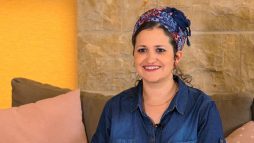
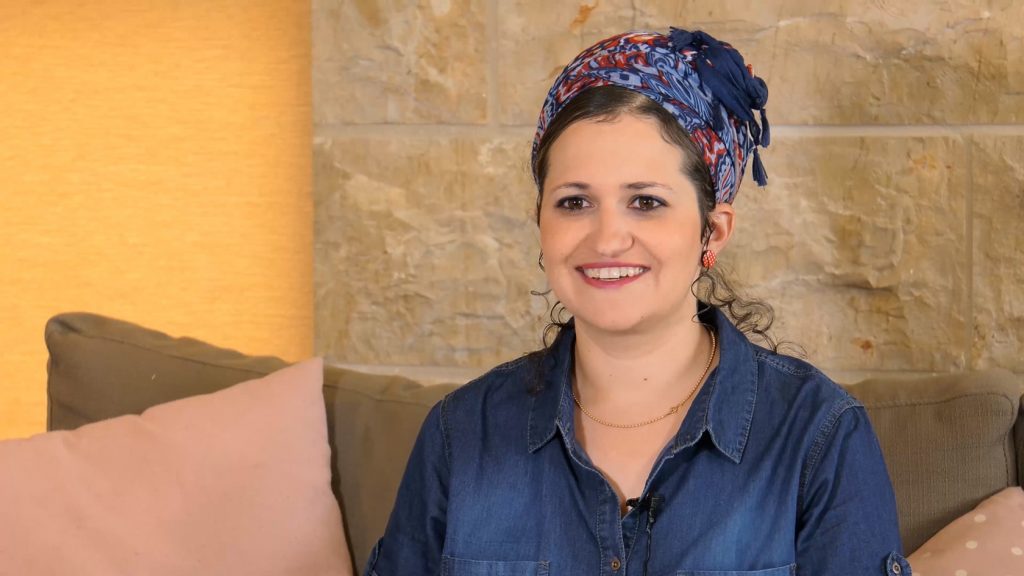
Naama Isaac, with her husband and their three children, live in the community of Tekoa, Judea. Naama has produced some wonderful products that have gone out in Lev Haolam’s Surprise Monthly Packages. Naama was born in Ofra where she lived for twelve years, when her family decided to move to Kochav HaShachar. Her parents were one of the first families to reside in the community after it had been established. “When Kochav HaShachar was created, they were looking for [new] families to move there to help strengthen the [young] community. So, we moved there for one year to help strengthen the community.”
Naama has an eye for graphic design. The name of the business she started is Studio Nekudotayim, which offers design, design strategy, marketing, and branding. “And among the various services I offer, there is a niche that interests me in particular – a unique niche within the design market and that is [the niche of] Judaica. Watercolor [creations], paintings, Jewish art, Ketubot (religious and ceremonious wedding documents) and similar items. I work less with commercial items and more on items for individual orders, like for instance a couple that is getting married, [I could make them] a Ketuba [a traditional marriage document that is frequently crafted with art to surround the legal part of the document] with a drawing of Jerusalem, specially personalized for him.”
It was because of her Judaica that Naama first became a producer for Lev Haolam. “And that is how I reached Lev Haolam. At the moment, I am working on a [designer] Megillat Esther (the story of Queen Esther and her hand in saving the Jewish people) for the upcoming package,” Naama said.
Naama then showed us the artwork that she had designed for Lev Haolam by hand – the design that would serve as the beautiful design frames and margins for the pages in the Megillat Esther. She explained to us that she was handling all the aspects of the creation of the books. “I am working on parallel designs (mediums) and will be blending the two together. [I’m using] watercolors, hand-drawn art, materials, pencils. This is one side of it. Afterward, I scan the art to the computer, then add the text. In the case of [this] Megillat Esther, it will be in two languages. This is overall what I do. I work from the house. For my business, I also employ two workers who live here in Tekoa.”
The work that Naama produces is bright, colorful and lively and we wanted to know how she came to choose Judaica as a specialty. Naama told us that she started creating Judaica professionally, in part, due to the murder of her cousin. Six years ago, her cousin, Achikam, was killed in a terrorist attack in Nachal Telem. He was hiking with his friend, David, and they were killed in a shooting attack. A few months after the attack, her aunt asked Naama for ideas as to what could serve as a memorial for Achikam. Naama recounted, “In particular, [my aunt] wanted it to be something that would be happy and lively. Instead of bringing up memories of the murder – the pain and the anger associated with it – the work to be done in his memory would be something with a focus on liveliness. At the same time, I began painting a friend’s chupah (wedding canopy).” The groom happened to be friend’s of Achikam and David. The groom and his bride got married underneath this chupah and it was extremely moving for the family and friends.
It was in Naama’s cousin’s memory that her first piece of Judaica, the canopy, was created and it served as an inspiration for more. “This was the first personalized piece of Judaica that I created. And for me, the experience was very strong, first of all, because I was very close to Achikam. Also because of the family that was celebrating the wedding… it was his [Achikam’s] friends celebrating the wedding and they were the same age,” Naama continued. “On the one hand, a chupahbrings together something which previously was not – the bride and the groom – and brings them together and on the other side, the chupah wraps the couple in a surrounding centered on the happiness of the building of something new and the new beginning that couple experience together.”
From there, Naama continued to fill orders for Judaica items such as synagogue mantles place cards, paintings for the house and other products that told a story related to Israel. She recalled with a smile how her niece, who was soon to be traveling to the United States, asked her to create something with the theme of the Seven-Species (foods that are indigenous to Israel) since she wanted to have something to always remind her of Israel. Naama created the momento for her niece.
We asked Naama how she decided to live in Tekoa and raise her family there. “For four years after we got married, we lived in the Jerusalem Hills,” Naama said. “You can’t compete against the green of the Jerusalem Hills and throughout all of Jerusalem, but with children, we looked for a community, for a place that allows freedom and space. Also from a communal point of view, Tekoa is very unique. We have a very diverse community. It’s a mixed community of both religious and secular… It’s a mixed community, really integrated, where community members share responsibility… There’s a lot of creativity in Tekoa, whether it’s music or art or pottery, really a lot of different kinds, so it’s also a very enabling environment for my creativity. Also, for our children, it’s a place with lots of space and views and air… We couldn’t have gone out to areas [of Israel] that are farther away.”
The Biblical connection to Tekoa is also important to Naama. “The streets in Tekoa are named after the Book of Amos, and we walk around here and it’s completely a Biblical land… But we are really here, living within a part of history, in a community that is broad and with such a longstanding history. I hope that Gush Etzion will succeed to present itself in a way that will give it sovereignty and will allow it to be here for many years, without fear and [instead] with acknowledgment of our right to really be here, in these important places… I can say that that heritage and Zionism are very important to us as a family as well as passing it on to our children, and my 4-year-old can tell you about Herodium and the subterranean caves. It’s very important to us. We take them, tell them about it and try to entrench it in the young ones.”
The close proximity of Tekoa to Jerusalem is important for Naama’s husband. “We are too attached to the area of Jerusalem. My husband Ronen works in Jerusalem. And the ability to be near on the one hand but on the other to be in a sort of community that is so unique really drew us here.”
Naama has been a producer for Lev Haolam a couple of years now and has created a number of products for Lev Haolam’s Surprise Monthly Package. “We found out about Lev Haolam about two years ago,” Naama recalled. “They wanted to promote and expand businesses with a focus on art and creativity in Judea and Samaria… and they asked for different products with different possibilities of art pieces for packages to send to supporters of Israel… It really warmed my heart to create products from Judea and Samaria at a time of so many boycotts and so much criticism and anger and accusations against the communities of Judea and Samaria, communities which I believe in and am so attached to. This project seemed amazing to me and.” Naama said, “I’m glad to be working with them again and, G-d willing, we’ll have more fruitful collaborations in the future.”
Naama then went on to describe the big opportunity that a large order from Lev Haolam provides Naama her and others like her – sole-proprietors and small business owners in Judea and Samaria. “The ability today of people in Judea and Samaria to export their products is very difficult. If we were from Jerusalem or Tel Aviv and opened a small shop, more people would come to us. In order to get to people, both in Israel and in the Diaspora, we have to make a very big effort through a marketing network that many artists have, a marketing network which I can say of myself personally that I don’t have. Also within the context of my art, I don’t have the time to market myself and network throughout the day. Projects such as this one really allow us to let our creativity greatly expand and reach other places, especially outside of Israel…. our ability through Lev Haolam to get to so many people with such massive marketing and our ability to be paid for a creative piece that we’ve worked on so long and made such an effort for – to whole-heartedly earn a living and to know that people are receiving the products and using them – that’s huge.”
EXCLUSIVE: Powerful Coffee and Powerful Ideals: The Story of the Treger Family
February 8, 2018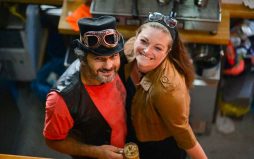
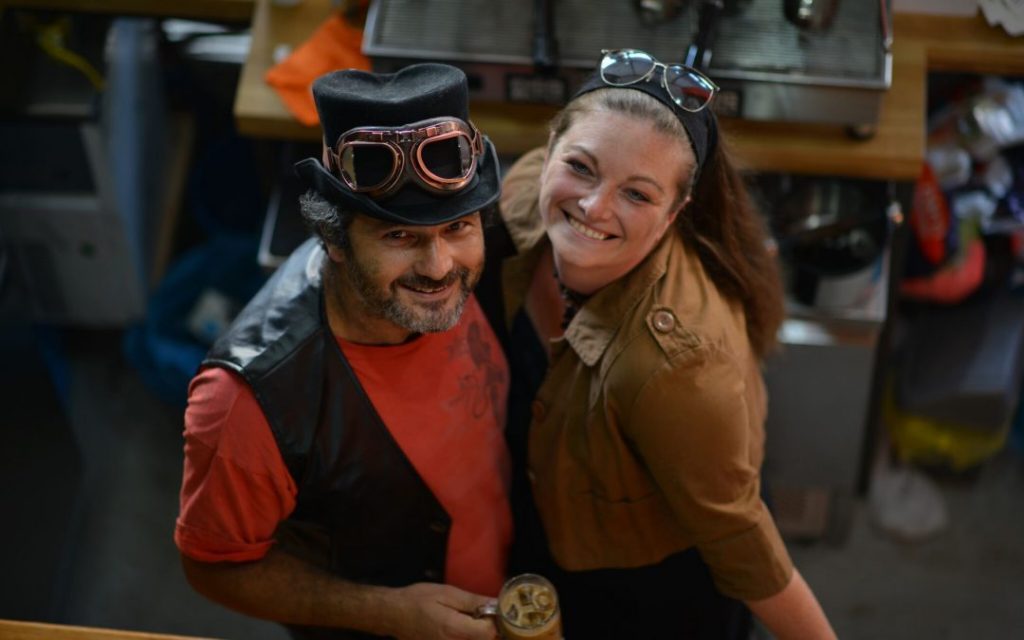
Brandon and Stephanie Treger immigrated to Israel with their four daughters from South Africa just over a year ago. The Tregers currently live in Efrat, one of the largest communities in Judea. In the short amount of time that they have lived in Israel, the Tregers already opened a chic boutique coffee shop called Power Coffeeworks. We recently went to visit and interview Brandon (and of course to taste the fantastic freshly brewed coffee), who is one of the newst producers for Lev Haolam’s Surprise Monthly Package Project.
We arrived at the shop on a cold and rainy morning and were offered a hot cup of specially brewed cappuccinos, by Avi, the barista working there. We ended up going back for seconds. It was truly amazing coffee! Avi explained that the coffee was made from a blend of three coffee beans. I tried to remember what the blend was but quickly forgot. We sat down at one of the tables in the upstairs lounge to interview Brandon, the founder. Thankfully, Brandon repeated the ingredients that were so carefully selected and blended to form the delicious drink we had just experienced. The ingredients in our coffee are the same ingredients that are in this month’s package. Brandon went on to tell us about the coffee beans and the best methods for preparing the coffee.
“In the Lev Haolam package, you’ve got our lightly roasted house blend which is perfect for black coffee or the ‘botz’ coffee.” Now to fully appreciate the interview, I want to introduce some of you to a new word that I learned during the interview. The word is “botz.” Having never heard the term before, I asked Brandon what “botz coffee” was. Brandon smiled and told me it was the Hebrew term used for the coffee grinds or sediment that sinks to the bottom of the when the grinds are used straight. In Hebrew, botz translates to “mud,” which is what the grinds at the
bottom of the cup closely resemble. “We call it botz, because at the bottom of your cup you’ve got botz.” Brandon continued to tell us about the coffee in this month’s package.
“We got a lovely blend [with beans from] Kenya, Brazil and Mysore, which will give you a bit of the high end spices of Kenya, the depth from the Brazilian [beans] and the smoothening out of the Kenyan [beans] with the Mysore. So, you guys are gonna have a great coffee. We’re going to grind it very finely so that the mud on the bottom will be quite tight and won’t interfere too much in your coffee experience – for when you get to the bottom of your cup.”
“When you need it quick, just pour some boiling water over it [the grinds]. Then add your honey or your sugar, let it sit for a few minutes and then the sediment will sink to the bottom and then you can drink it until just before the bottom.” Brandon told us. “The other way of drinking it, for when you got a bit more time, is to put it in a pot, boil it up with the sugar or honey you enjoy, let it settle for a few minutes and then boil it a second time. Let it settle, pour it out [and it will be] without the bots at the bottom of the cup and sit back and enjoy the caffeine hit.”
After hearing about this month’s coffee, we discovered that the idea for Power Coffeeworks and Brandon’s passion for his work was a recent development. Just a few years ago, Brandon was living in South Africa and working as a security and prehospital paramedics consultant.
When inquiring about how he got started in coffee, Brandon started by telling us about his life in South Africa. “After I had my first child, in 2010, I started feeling a different influence from the paramedics and security industries. I started really struggling to do that kind of work. I realized later that I was also suffering from PTSD (post-traumatic stress disorder). It became more difficult for me. It started triggering hyper-anxiety and unpleasantness and by about 2013 I actually didn’t want to continue at all.”
“When we were making Aliyah, I realized that I wanted to roast coffee and to make coffee for people and sit and talk to people across the coffee bar. That’s what I wanted for my future. And I wanted my kids to hang out in the coffee shop and to have this environment that you see around us now. It was a dream,” Brandon concluded.
Brandon then elaborated on how he actually opened Power Coffeeworks. He explained that his father-in-law has been in the food industry for quite some time. “He has a restaurant, he produces [his own] chili sauce – he’s a flavors guy.” Additionally, Stephanie, his wife, is very artistic and has a “flare” and a good sense for fashion, as Brandon put it. We got to see her natural knack for design in action by looking around the shop which she designed. The shop’s decor is unique and simply breathtaking for those who admire detail. So with his father-in-laws knowledge, his wife’s artistic flair, and his dream of opening a peaceful place to enjoy good coffee and even better company, the Tregers had all the ingredients they needed to get the Power Coffeeworks store off the ground.
On a more personal note, moving countries can be extremely challenging. Especially when you have a family. And while the Tregers are no exception to the challenges they face as immigrants, we could not help but admire Brandon’s face as it lit-up when he spoke about the opportunities he has found by living in Israel and how his children are thriving in their community, Efrat.
“For me, everything is about the children. The thing I love the most is the environment that it offers the children.” “For children, Judea is the best area for children and our area of Efrat is the most amazing environment. The schools, the facilities, the social environment.”
In one heartfelt story, Brandon recalled, “My little twins were swimming last year in Elazar (Judea) and they started crying. And I didn’t know why they didn’t want to go swimming. I was saying but you’ve always loved swimming. [Before I had taken them to the pool] I had told them that they were going swimming like when they used to go swimming in Capetown. And they thought I was taking them back to Capetown and they started crying.”
“I love the fresh air here, I love the rolling hills, the vineyards and the fact that we can go for a walk through the vineyards and enjoy the open air environment,” Brandon tells us. “Those that came to Efrat 30 years ago built an environment that’s phenomenal and we’re just settling into that environment.”
Not far from Efrat is the holy city of Hebron. In addition to being a superb coffee maker, Brandon is also a proactive advocate for spreading awareness and educating others about the history and the present significance of the Judea region. “I take people on tours to Hebron as a bit of a passion. I study Torah in Hebron every Tuesday. [Also] Stephanie and I have a connection to Hebron, which dates back to a Shabbat we spent there and we connected with some special people that were kind to us.”
“Sometimes I do a little tour of Gush Etzion and I explain a history of the Gush. I take them down Derech Avot (path of the forefathers) and I show them how our ancestors were traveling through this area, heading to Jerusalem, stopping along the way for a mikvah (ritual bath) and that our life has been recreated in this area. That we returned as Jews in our indigenous environment. And then I go through to Hebron – the plains of Mamre. I get a lot of pleasure out of people connecting to Hebron that may be used to thinking of Hebron as an esoteric place, a place that they see in the news [and now they see] that it’s just another place in Israel, a part of our roots. I try to share what makes it special to Steph and I,” Brandon explained. Before this month Brandon had known about Lev Haolam for quite some time. He wanted to become involved in what we were doing and subsequently contacted our product specialist, Neriya. When Neriya got back in touch with him, Brandon recalled emphatically, “It was great! I was really happy to get the call. It felt cool – like these are the guys I want to be involved with.”
Brandon told us that the order he received from Lev Haolam was the largest order he has ever received. We were, of course, happy to hear this. “We don’t deliver that volume in one delivery by a long shot. We’ll usually deliver about 12 kilos [kilograms] at a time. Here, we’re delivering 350 kilos.”
Brandon wanted us to tell the Lev Haolam subscribers the following message, “I’d like to thank you guys, both for the business because earning a living as a new immigrant is really
important to me. I’d like to thank you guys for creating the biggest order we’ve had since opening our business. Thank you guys and I hope you love the coffee!”
EXCLUSIVE: Fashion With A View, The Story of Yael Rozmarin
January 15, 2018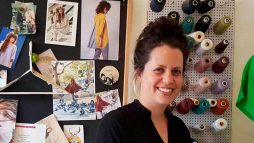
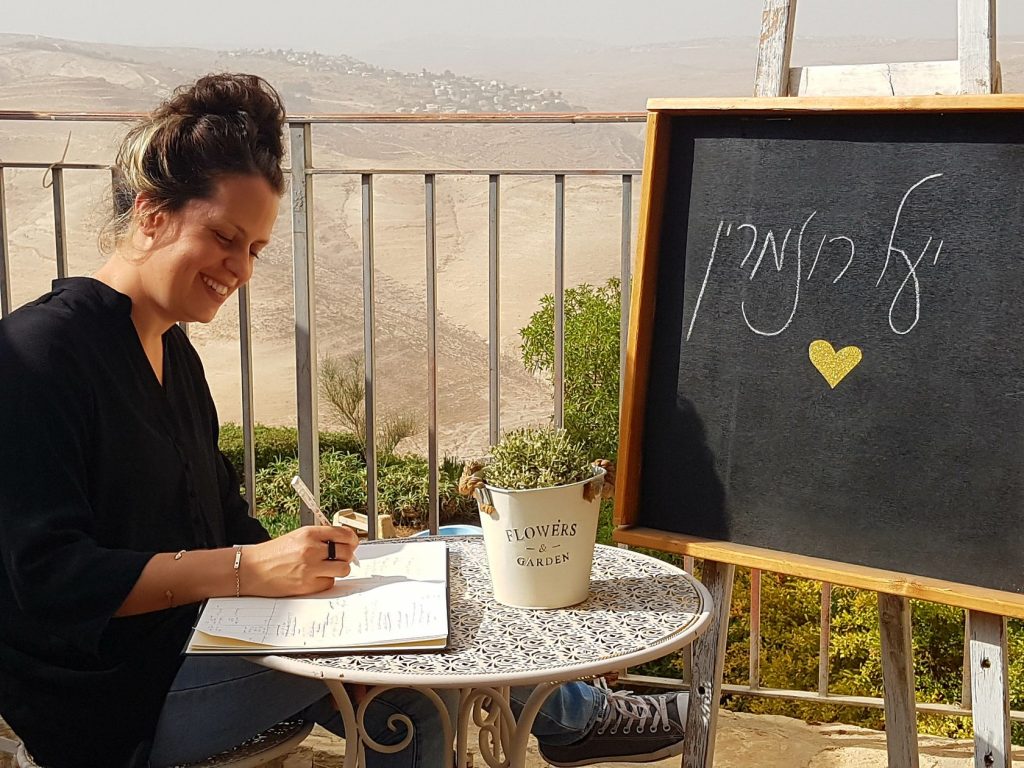
We recently drove out to the beautiful neighborhood of Nofei Prat- located in the community of Kfar Adumim – to interview Yael Rozmarin, one of the producers for Lev Haolam’s Surprise Monthly Package Project. Upon entering Yael’s studio it became apparent that we were meeting with a sweet, warm woman. Given her calm demeanor, you wouldn’t realize that Yael had three children and ran her own studio on meeting her for the first time.
We learned over the course of the interview, the quiet and serene lifestyle that Kfar Adumim provides its residents was one of the most influential reasons she and her husband chose to live there. Yael told us that before she lived in Kfar Adumim, she and her husband lived in Jerusalem – Yael is actually a 9th generation Jerusalemite! Yael and her husband, Boaz, were childhood sweethearts. Apparently, they knew one another since early childhood and began to date each other at a very young age. Luckily, it lasted and they got married and started their own family.
After Yael and Boaz had Itamar, their first child, they looked for the ideal community to settle their family. They were looking for something quiet and quaint. After coming across the community of Kfar Adumim on a real estate website, Yael read that there was a beautiful subcommunity just up the road from the main part of Kfar Adumim called Nofei Prat. She decided to look into this suggestion.
After visiting the neighborhood of Nofei Prat and the community of Kfar Adumim, which is located just north of Jerusalem, they decided that the community was just right for their small family. “We saw this apartment with an amazing view, and we decided to take it,” Yael said.
Yael recalls, “after being here for 2 weeks, my son [who just started talking], began to say words like bird, dog and sky. When we in Jerusalem, his first words [there] were car, bus and train. It’s amazing how the environment inspires speech in such a way… this is a place that kids should grow up in.”
Yael continued to tell us how much she loves her community. “I live in an amazing place with an amazing community. Besides the views and everything else, the people here really makes the place. Everyone accepts one another which is so amazing. We live in a mixed community, with a mixture of religious and secular people.”
In addition to the community being a great place to raise her children, the quiet surroundings and great views serve as constant inspiration for Yael’s work. She has now been at her studio, which is located near her home, for three-and-a-half years. “The environment brings me inspiration. [The environment] is part of my design. My design is classic, very clean and without a lot of decorations and pieces to it,” Yael says about her studio and the surrounding views. “When you wake up and this is what you see, then you can be more calm and at peace with your thoughts, your designs and sketches,” Yael concludes.
In an aside, Yael tells us she can see mountain goats wandering outside. We knowingly smile, as Yael’s name actually means mountain goat.
I asked Yael about when she first knew that she wanted to be a fashion designer. She started by telling us the story of her first big sale. Yael was about 15 years old at the time and she really wanted to go skydiving. She would only be able to legally go skydiving at sixteen. Her strong desire to go skydiving gave her the motivation start working and earn money while doing something she enjoyed. She set out on her first job.
“I always knew I would do something with my hands. I always liked working with my hands, drawing building…” Yael said.
“[So] I took some wood from [wooden] sheets and I cut it into pieces and then I took it and made it into a ring and drew [designs] on the wood. I then made small cuts on the wood using a bath sponge. I went to the flea market and sold it there for 20 shekel [each]. They sold like crazy,” Yael said. “Then I sold it at my school, I studied at an art school. Then the rings caught the attention of a store owner and he bought something like 50 rings. It was crazy.”
“And after a few months [of saving up] I went skydiving with a bunch of 20 shekel bills,” Yael said while we laughed at the funny scene of her handing the vendor a thousand shekels worth of money in 20 shekel bills. “And that was my first job ever,” Yael concluded.
I asked Yael if her success was connected to her love for her profession. She said, “I think that if you love something, then you’ll be good at it.” (13:45)
Yael then continued to give us her more formal design background. “I studied industrial design at the Shenkar school of design. In my second year there, I started sewing things for myself. And then friends started asking me to make them various things for them too. And then after a few months in my third year, I decided I couldn’t do it myself anymore. [At first] I used to sew at night and then I would go into school in the morning. And then I decided that I was pregnant and at the time was too much – to be in school and to open a business. I then sent it to a place that made the cuts for me. And this was like a big deal for me. And I think that’s when the business really took off. Once I could let someone else do the sewing, I had the opportunity to focus more on the design.”
I asked Yael if her parents had anything to do with her career choice. She said, “yes, my Father’s hobby is woodworking. Just a hobby. [Growing up] we had a small woodworking workshop in our home. My Mom ran a nursery. So, we used to make things [together] for my Mom’s nursery. When I wanted a desk and I would ask my Father for it, he would say, OK, draw for me what you want and I will build it for you. And that’s what we did. We drew it, we measured the different sizes. At first I would sketch the outline for the furniture, but later we would also sand the wood. And today, my sons help me to take measurements and to sand the wood with me.”
Yael then pointed to a work desk that her Father had built and that she used in her studio today, many years later.
I asked Yael about to tell us about the shawl in this month’s package. Her response was beautiful. “I was pregnant with my third baby when I made this shawl, her name is Ori and this shawl’s name is Ori also. When you’re pregnant you’re not sure how you’ll look and what you’ll wear after, and so I wanted to make sure that I would have what to wear after and for the last days [of pregnancy]. I always say that it’s better to buy things, like jewelry or scarves or tops and that’s how I thought of this shawl. And I made it out of a variety of fabrics. It can be used in the Summer and during the Spring. I made it and I called it Ori. The names of the dresses and shirts [that I made during my pregnancy] were all names that could be the name of my baby. It was like a test. And so I named this shawl Ori since I liked this one the most and I hope you will enjoy it.”
In concluding our interview, Yael wanted us to thank Lev Haolam and all of our subscribers for their support. “First of all, I love working with Lev Haolam. It is a big support for me and my studio. It’s great exposure for my studio and I find it amazing that people from all over the world believe in us and want to support us. It’s really great to have such support and I’m so glad that I met you,” Yael said emphatically.
EXCLUSIVE: The Sounds of Silence, The Story of Eliezer Rosenfeld
January 11, 2018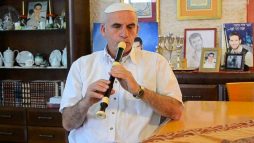
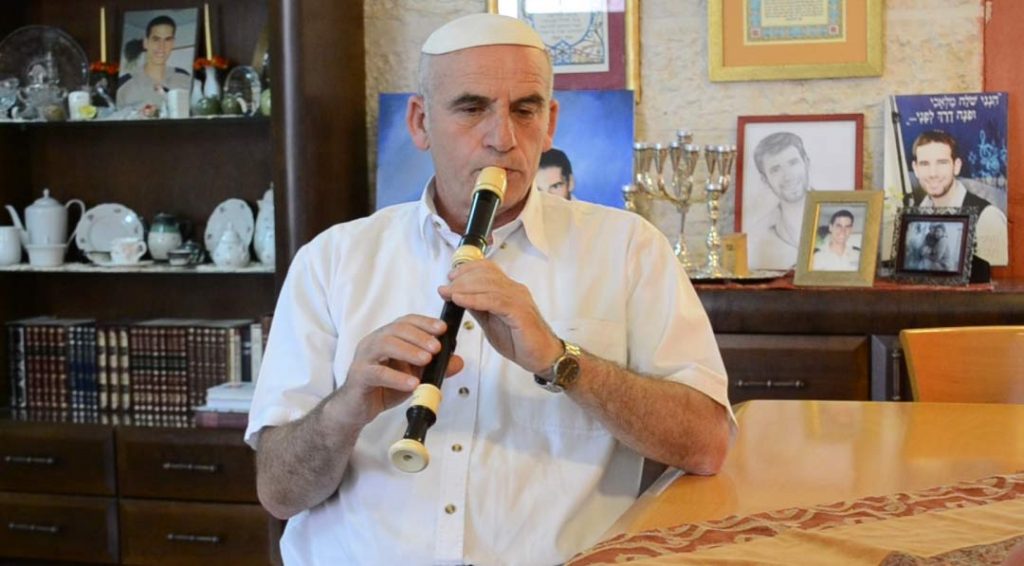
On a warm Thursday morning, the Lev Haolam team drove through the mountains of Samaria to a small community called Kohav Hashahar. It was there that we had planned to meet and interview Eliezer Rosenfeld, a musician and producer for Lev Haolam’s Surprise Monthly Package Project. Unbeknownst to us, Eliezer had much more in store for us than a simple interview. After we began the interview, Eliezer drew us into his story, painting his memories with words.
As he started to tell us about his life, we were no longer sitting on his couch in Kohav Hashahar, but instead were taken through space and time to his childhood home in Jerusalem. We observed two children playing in war trenches. It was before the Six-Day War, on a street bordering what was then Jordan. The younger child, Eliezer, and the older one, Yitzhak, were very busy at play. Their tunnels transforming into secret passages to a magical kingdom and the barbed-wire lining the border becomes the waves of the sea. The game abruptly stops when their mother calls them for dinner. It is a hot summer evening and everyone is sitting around a small table. It is crowded but no one seems to care and instead they all enjoy a tasty meal.
Fast forward just a few months and we are now in a synagogue. It is Yom Kippur, the Biblical day of Judgment. All the men are wearing their prayer shawls, praying and fasting. The chazzan, cantor, is in the midst of a wonderful song, an old tune he learned in the old country, before the Holocaust. He suddenly stops for a moment and looks around for his son, Eliezer. He gently gestures to Eliezer to step forward to the platform before the Torah scrolls, and then points to a passage in a prayer book and continues singing. Eliezer joins him in song, first quietly until the words find their way out. Together with his father they sing the unforgotten songs of Slovakian Jewry. “It was very important to my father that I learn how to sing. Starting from the age of 4 he taught me the near-lost folklore of his community in Europe and when I was only 5, I was already standing by his side in the synagogue while he chanted the High Holiday prayers”.
Song was always an important part of Eliezer’s family. As a young adult in high school, Eliezer and his brother, Yitzhak, enjoyed the weekly tish that took place every Thursday night in their high school. A tish which literally translates a table refers to a Jewish social event at which the participants sit around a table, sing Jewish songs and share different stories from Jewish folklore. “We sat around the table and sang until it was midnight,” reminisced Eliezer. “Singing was everything for me, but at the same time I had another dream; I wanted to learn how to play the clarinet. I once heard a clarinet and fell in love with the instrument, but I couldn’t ask my parents to buy it for me because I knew they couldn’t afford it. My brother Yitzhak had a different dream. He wanted to become an army commander, so he signed up for a Hesder program, which combines Jewish Yeshiva studies and army service. I followed him to his Yeshiva in Maalot, and again, we were singing together. But unfortunately, our duet was short-lived and ended with one heart-breaking phone call.”
“It was 11 O’clock on a Wednesday morning. My studies were interrupted suddenly, and I was called to the payphone next to another student. On the other end I heard the trembling voice of my father, telling me that Yitzhak was killed during his army service. This was the first time I met the Angel of Death. The singing, the dancing and the joy disappeared at once and I felt like I was endlessly falling. While I was deep in grief, a small voice inside called me to go fulfill an old dream. I gathered my strength and went to a musical instrument store to purchase a clarinet. At first, the instrument wasn’t so promising. It took me a long time to get a sound out of the clarinet. I understood that I had a long way ahead of me.”
Slowly, Eliezer taught himself how to play the notes and connect them. He moved back to live near his parents and started learning at the Yeshiva (advanced Jewish seminary for Torah study) of the Western Wall. “It was there that it happened for the first time. Suddenly, people started asking me to play at their events and weddings. Life started drawing me back, returning the happiness, while at the same time realizing that the grief had settled in my heart and had became a part of me.”
“I felt how the music was curing me, as if it was the hand of G-d that guided me and brought me back to life. Since then, thank G- d, I have played at thousands of weddings and other joyous events. It is a great privilege to be a part of people’s happiest moments in life,” Elizer added.
Eliezer joined the army, following in his brother’s footsteps, but his father asked him not to draft to a combat unit and he respected his father’s wish. During his service he met his wife to be, was married soon after and two years after his brother’s death, Eliezer and his wife gave birth to a son Yitzhaki. Yitzhaki was named after Eliezer’s fallen brother.
After the birth of their son, Eliezer and his wife started looking for a new place to live. Both of them were idealists and dreamt to start a new Jewish community. This is how they arrived at Kohav Hashahar (literally translated as ‘The morning star’), a picturesque little village between the biblical cities of Samaria and Jericho. Eliezer started working the land, planting vines and cultivating them. “It was difficult physical labor; I worked 18 hours a day,” Eliezer recalls.
But, like before, the music drew him back. After taking time to further his musical studies, his musical ensemble started gaining a lot of popularity. “My favorite instrument is the recorder and I get teased about it frequently by fellow musicians, but I don’t mind. I think it is a very spiritual instrument.”
You wouldn’t be able to tell from Eliezer’s great enthusiasm about music and life that he went through great tragedies and grief, more than once. His beloved son Yitzhaki, who was named after his fallen uncle, was a bright young boy with a brilliant future ahead of him. He joined the army and passed the prestigious air force course, becoming a pilot. During a vacation from the army, Yitzhaki and some friends went for a hike in the south of Israel but the weather turned grim very fast and before having enough time to respond, they were caught in a flood. Their jeep rolled over and began drifting with the current. Both, Yitzhaki and his friend managed to escape the car and tried to reach dry land. His friend made it, but unfortunately Yitzhaki didn’t.
“It was such a great loss that I can’t even put it into words, and grief brought a long series of unanswered questions. After his death, we discovered that both my brother Yitzhak and my son Yitzhaki lived the same number of days, which was 8055…. Every day I pray for G-d to give me strength to continue.”
At the time of Yitzhaki’s passing, Elizer’s second son, Malachi, was 12 years old. Malachi was good with mathematics ever since he was a young and after he had served in the Israeli army, Malachi graduated from a tech-based university. Every Saturday night Malachi and his father Eliezer would enjoy playing basketball, one of their favorite sports. Every year there was a local basketball tournament in which Malachi took part.
A little over a year ago, after one of the games ended, Malachi and his teammates were driving on their way home when a group of Arab terrorists blocked and ambushed the car. The terrorists shot 19 bullets at the car. Malachi was critically injured and passed away a few hours later.
“During Malachi’s funeral, when I ran out of words, I started singing. I sang a song about the great tragedy of the Holocaust, when G- d’s presence was less apparent to the many who suffered.
I don’t think I have the right to stop playing music and singing even if the pain is so great. We don’t have any anger in us, only questions. Why did it happen to us twice? We know that better days are going to come. Our great consolation is that we gave everything we could to our beloved sons, and we received back everything they could give us,” Eliezer faithfully tells us.
At this point in the interview, Eliezer brings out an album that is filled with letters to him, all of them from complete strangers. Some people just try to comfort him for his great loss, while others compliment him on his music and tell how it does wonders for them. There are letters from a nurse in a hospital, a mother of an autistic child and an ultra- orthodox man. All of them praise his tender, soulful tunes and comment about how his music makes them feel. “Every Friday I get a phone call from a Jew in Queens. He happened to be in Israel at the time of the terror attack that took Malachi’s life. This man also rushed to the hospital. There, he hugged me and prayed for Malachi. Ever since, he calls me to wish me a ‘good Shabbat’.”
The new CD that was featured in Lev Haolam’s Surprise Monthly Package was Eliezer’s 11th Album and was dedicated to his son Malachi. He thanks us for our support. “Nowadays it is not financially worthwhile to make music discs, but I still do it, I must. Thank you for helping me cover my expenses.”
Watch the impromptu performance that Eliezer was kind enough to give us during our visit below.
When we Eliezer about why he still lives in Kohav Hashahar, he answers modestly: “We are normal and simple people. We believe it is our right to live here after the pogroms and troubles we went through [in Europe]. Unfortunately, our Arab neighbors don’t want us to exist.”
At the end of our interview, Eliezer asked us to pass a message on to the supporters of Lev HaOlam. He would like to invite you to visit Israel, as guests at his house. “I want to hug them and thank them for them for their encouragement.”
EXCLUSIVE: Ceramics Made With Love: The Story of Batya Erdstein
January 3, 2018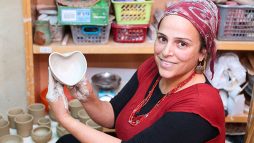
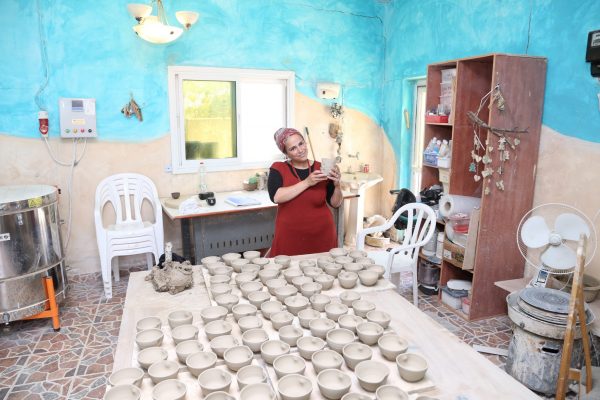
Batya and Baruch Erdstein, with their six children, live in Itamar, a community located amidst the Samarian hills. Batya is originally from San Diego, California. She has a very pleasant, easy-going and spiritual demeanor. Batya has produced some of the fine ceramic products that have been sent in Lev Haolam’s Surprise Monthly Packages. We went to Itamar to interview Batya and to hear about her journey to and in Israel.
Batya told us that her and her husband had always been interested in living in Judea and Samaria. “When we first got married, we lived in Bat Ayin [Judea], but then we moved to Tsfat and then we found ourselves back here in the Shomron again… It’s one of the most beautiful places in Israel,” Batya tells us.
Batya continued to tell us about the ‘why’ that brought her and her family to Samaria. “I could have lived my life in San Diego, California working as a nurse and making a lot more money, but I believe that being here is our duty as Jews and I’m willing to put my life on the line to live here. And to be a part of the return of the Jewish people from all the four corners of the world to here, and to raise my children here… and it’s hard work but it’s beautiful work and we’re very excited to be here.”
Batya also finds inspiration for her work from her surroundings. “Things that are growing outside I pick and I bring it to the studio and I press it into the clay and I get ideas and inspiration through everything that is growing around me,” Batya told us.
The history of Samaria is also something that Batya apreciate very much. “Sometimes we take walks and we find old shards of pottery pieces and it really centers me and I know that what I’m doing here is reconnecting to Jews who thousands of years ago who were living here in this area and who were working with a pottery wheel and who were working with the same simple medium; working with clay and developing it into beautiful pots and that’s very special.”
Batya hasn’t always worked as a ceramics artist. “Originally I studied midwifery and it’s interesting because in the Torah it is written that the place that a woman gives birth is called ?ovnaim?, which is actually the same word for a pottery wheel and so the two are very connected,” she told us. Although one day her dream is to become a full time midwife, Batyah is happy with the success that she has seen so far from her work with ceramics. “I love it,” Batya said. “It’s just been developing more and more through the years. And my things are in some galleries and shops around Israel and all over the world. And it’s very exciting to know that I am making things out of clay and they are from here, from Israel… and they’re going all over the world.”
Batya is happy to be working with Lev Haolam and she tells us, “for me, I really feel like I’m doing something important now that these things are going out and it [helps] to support this area. And people are seeing us as a light to the world… and it’s important that my products go to people that appreciate them. I hope you love them and think of me when you use them.”
